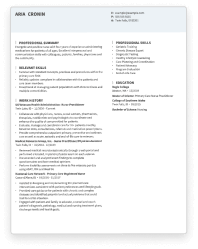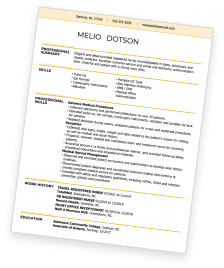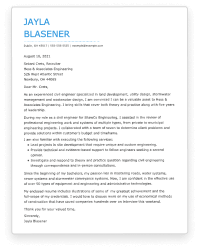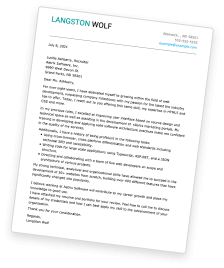Financial Analyst Resumes: Overview
From corporate finance to investment banking, financial analysts play a crucial role in analyzing data, making informed recommendations, and influencing strategic decisions.
Some specific financial analyst roles include:
- Financial Planning and Analysis (FP&A) Analyst
- Investment Analyst
- Risk Analyst
- Budget Analyst
- Quantitative Analyst
Any great financial analyst will possess a diverse skill set that combines technical expertise with strong analytical and communication skills.
Building a great resume like the ones on this page can be the difference maker in getting your next job as a financial analyst.
Check out more of our downloadable resume examples designed by career experts and use one of our free and premium resume templates today!
Financial Analyst Resume Example: A Modern Template
This resume example for a financial analyst showcases several compelling advantages that can explain why you are pivotal in driving informed financial decisions and supporting business growth:
-
Versatile:
This resume highlights your expertise in financial analysis across various sectors, making it suitable for various finance positions, from corporate finance to investment banking.
-
Data-Driven:
This resume demonstrates your impact as a financial analyst through measurable achievements, such as successful investment recommendations and cost-saving strategies.
-
Clarity:
With a well-structured layout and organized content, this resume ensures easy readability, allowing your qualifications to shine prominently.
-
Specialized:
The resume emphasizes your specific financial skills and analytical approaches, ideally matching the requirements of finance firms seeking those attributes.
Financial Analyst Resume Example: A Classic Template
As a platform to showcase your qualifications and passion for financial analysis, this financial analyst resume example exemplifies the following distinctive features:
-
Traditional:
The classic design of this resume will direct the reader's attention and ensure easy navigation through essential information.
-
Quantifiable:
This resume effectively utilizes data and measurable outcomes to bolster your proficiency as a financial analyst.
-
Structured:
With clear section headings and a well-organized layout, this resume maintains a neat appearance, allowing your qualifications to take the spotlight without any distractions.
-
Relevant:
Every detail on this resume aligns with the requirements of financial analysis roles, providing the reader with precisely the information they need to evaluate your suitability.
How to Write a Financial Analyst Resume
Crafting an impressive financial analyst resume is crucial to making a positive impact in the competitive job market.
Your resume is a powerful tool to showcase your financial expertise, analytical skills, and professional achievements.
Follow these expert tips to outline a compelling financial analyst resume that stands out and gets noticed:
-
Start with a Strong Header:
At the top of your financial analyst resume, include your full name, contact information, and a professional email address. Make sure your contact details are up-to-date and easily accessible.
-
Write a Convincing Summary Statement:
Begin your resume with a well-crafted summary statement that highlights your financial knowledge, areas of expertise, and years of experience. Tailor it to the specific finance roles you are targeting.
-
Detail Your Work Experience:
In the work experience section, emphasize your past roles as a financial analyst, starting with the most recent position. Focus on your accomplishments, such as successful financial recommendations, cost-saving strategies, and contributions to revenue growth.
-
Showcase Your Educational Background:
List your academic qualifications, including your degree in finance, accounting, economics, or a related field. Mention any certifications or licenses that enhance your credibility as a financial analyst.
-
Highlight Your Financial Skills:
As a financial analyst, you possess a diverse range of skills. Showcase your proficiency in financial modeling, data analysis, forecasting, budgeting, and risk assessment. Tailor these skills to match the requirements of the financial analyst positions you are applying for.
-
Add Additional Relevant Information:
If you have any additional experience that is relevant to your qualifications as a finance analyst, then you can add them in separate sections. This can be for things such certifications, awards, professional affiliations, and volunteer experience.
Skills and Certifications for a Financial Analyst Resume
In the ever-evolving finance landscape, having the right skills and certifications on your financial analyst resume can make all the difference. It’s crucial to showcase both technical and interpersonal abilities.
Hard skills are specific, measurable competencies acquired through training, education, or experience. They are often related to technical expertise and are essential for excelling in the finance industry.
Soft skills, on the other hand, encompass personal attributes and interpersonal abilities that enable effective communication and collaboration in a professional environment.
Here’s a rundown of the essential skills and certifications you should highlight to impress potential employers as a financial analyst:
Top 5 Hard Skills for Financial Analysts
- Financial Modeling: Proficiency in building and analyzing financial models to assess performance, make projections, and support decision-making.
- Data Analysis: Expertise in gathering, interpreting, and synthesizing financial data to generate valuable insights and identify trends.
- Forecasting and Budgeting: Ability to develop accurate financial forecasts, budgets, and variance analysis to aid in strategic planning.
- Financial Software: Familiarity with financial software and tools such as Excel, Bloomberg Terminal, or SAP, are essential computer skills for efficient data analysis and reporting.
- Risk Assessment: Skill in conducting risk assessments and evaluating potential financial risks to guide investment decisions and mitigate vulnerabilities.
Top 5 Soft Skills for Financial Analysts
- Analytical Thinking: Strong analytical skills to assess complex financial data, identify patterns, and make informed recommendations.
- Communication: Effective communication and presentation skills to convey financial insights to stakeholders in a clear and concise manner.
- Teamwork: Collaboration and teamwork abilities to work effectively with cross-functional teams and support collective financial goals.
- Time Management: Excellent time management skills to meet deadlines and handle multiple financial analysis tasks efficiently.
- Adaptability: Flexibility and adaptability to respond to changing financial markets and industry trends to make informed decisions.
Tailor your financial analyst resume to showcase these hard and soft skills, demonstrating your expertise and suitability as an exceptional financial analyst in 2023.
Top 5 Certifications for Financial Analysts
Additionally, it can be very helpful to include any relevant certifications you might have as a finance analyst. Here are some of the more popular certifications applicants may include in their resumes:
- Chartered Financial Analyst (CFA): The CFA designation is a prestigious certification recognized globally, demonstrating expertise in investment analysis, portfolio management, and ethical standards.
- Financial Risk Manager (FRM): The FRM certification signifies proficiency in identifying and managing financial risks in various sectors of the finance industry.
- Certified Public Accountant (CPA): The CPA certification is valuable for financial analysts involved in accounting, auditing, and financial reporting.
- Certified Financial Planner (CFP): The CFP designation is ideal for financial analysts specializing in personal financial planning and wealth management.
- Microsoft Excel Certification: While not specific to finance, Excel proficiency is essential for financial analysts. Earning an Excel certification can bolster your credibility in data analysis and financial modeling.
Including these certifications in your financial analyst resume showcases your commitment to professional growth and further enhances your qualifications as a financial expert.
Helping Job Seekers Like You
Tips for Writing a Financial Analyst Resume
Crafting a winning financial analyst resume is essential to stand out in the competitive finance job market.
Your resume serves as a powerful tool to showcase your financial expertise, analytical skills, and suitability for the role.
Follow these expert tips to create a compelling financial analyst resume that grabs the attention of potential employers:
- Tailor Your Resume to the Finance Role: Customize your financial analyst resume for each job application. Analyze the job description and research the company to understand their specific requirements and values. Tailor your resume to align with their needs, highlighting relevant skills and experiences.
- Start with a Powerful Summary Statement: Begin your financial analyst resume with a strong and concise summary statement that encapsulates your financial expertise, areas of specialization, and years of experience. Make sure to tailor it to the specific finance roles you are targeting.
- Showcase Relevant Financial Skills: As a financial analyst, you possess a diverse set of skills. Highlight your proficiency in financial modeling, data analysis, forecasting, budgeting, and risk assessment. Align these skills with the requirements of the financial analyst positions you are applying for.
- Quantify Your Achievements: Back up your accomplishments with measurable data and specific numbers wherever possible. For instance, mention the percentage increase in revenue you contributed to, the cost savings achieved through your financial recommendations, or the success of your investment strategies.
- Demonstrate Analytical Abilities: Financial analysts are known for their ability to interpret complex financial data. Showcase your analytical skills by providing examples of how you’ve used data to drive valuable insights and support strategic decision-making.
- Highlight Financial Software Proficiency: Mention any experience with financial software and tools such as Excel, Bloomberg Terminal, SAP, or any other relevant platforms. These technical skills are highly valued in the finance industry.
- Emphasize Effective Communication: Effective communication is vital in finance. Highlight your ability to present financial analysis in a clear and concise manner, both in written reports and during presentations.
- Keep the Format Clean and Professional: Maintain a clean and professional format for your financial analyst resume. Use bullet points to present information clearly, and ensure consistency in font style and size.
- Include Relevant Certifications: If you have any relevant certifications such as CFA, FRM, CPA, or CFP, be sure to include them in your resume. Certifications showcase your commitment to professional development and enhance your qualifications.
- Proofread and Edit Thoroughly: Before submitting your financial analyst resume, proofread it carefully to catch any spelling or grammatical errors. Also, ensure that the formatting is consistent and easy to read.


Save Time With Our Resume Builder
Key Takeaways
Financial analyst resumes are essential for showcasing expertise in finance and analytical skills to potential employers.
Versatility, data-driven achievements, clarity, and specialization are all key attributes to a successful resume.
Tailor your resume to the job description to make your resume ATS-friendly and stand out for the reader.
The importance of quantifying achievements with measurable data demonstrates your impact and value as a financial analyst.
Be aware of hard skills such as proficiency in Excel, Bloomberg Terminal, or SAP that solidify your qualifications.
Save Time With Our Cover Letter Builder


Financial Resume FAQ
Citations
- Bureau of Labor Statistics. “Financial Analysts,” Occupational Outlook Handbook, September 2022.
- Bureau of Labor Statistics. “13-2051- Financial and Investment Analysts,” Occupational Employment and Wage Statistics, April 2023.
- Olivia Crosby, “Resume, Applications, and Cover Letters,” Occupational Outlook Quarterly, 2009.
- University of Michigan, "Resume Resources," November 2023.






